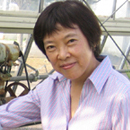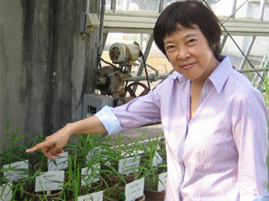KURATA, Nori D. Ag., Professor

- Plant Genetics Laboratory, Kurata Group
Searching for the ultimate question
“Finding an answer to a ready-made question is not difficult even for a student. My greatest pleasure as a researcher lies in finding my own questions,” says Prof. Nori KURATA with a tranquil expression on her face, standing in front of an experimental field where precious wild species of rice brought from all over the world by generations of scientists are kept. Since she arrived at the NIG ten years ago to make available information and research resources most valuable, she has been searching for her ultimate question.
- Fascination with chromosomes during student days
- Factors for determining a researcher’s area of specialization may come quite casually as an interesting topic or some personal touching experience. In Dr. Kurata’s case, it was chromosomes: “When I first saw them, I was fascinated with the way they were neatly arranged and moved as designed.” She spent her student days totally absorbed in the observation and identification of various chromosomes of grasshoppers, lilies and rice. “I really felt that the root of life science is in genetic information, and I wanted to look deeply into the contents, shapes and movements of chromosomes packed with genetic information.” Motivated by such desires, Dr. Kurata moved into the field of molecular biology. “In those days, molecular biology was not widespread. So I simply went where I was accepted.”
- Foundation for research promotion
 As a postdoctoral researcher, Dr. Kurata mainly worked with animals. It was in 1991 that she went back to plants: she was offered the post of Project Leader for the Rice Genome Research Program inaugurated mainly by the Ministry of Agriculture, Forestry and Fisheries of Japan. She was torn between two thoughts. On one hand, she wanted to focus on research that was closer to her interests; on the other hand, she felt that the overall level of research into rice and other plants would stagnate if somebody did not take the leadership. Finally, she accepted the offer, convinced that the Project would provide her with tools for studying genomes in detail, which she desired herself. “Somebody must start, so I decided that it would be me.” Phase I of the Project involved massive genetic analysis, genetic mapping and physical mapping. Since 1998, new projects have been launched in view of new developments, including the complete rice genome nucleotide sequencing project and full-length rice cDNA project. Once these projects were inaugurated, the foundation was built up far faster than Dr. Kurata had expected. Changes that took place had enough impact to modify the nature of the discipline.
As a postdoctoral researcher, Dr. Kurata mainly worked with animals. It was in 1991 that she went back to plants: she was offered the post of Project Leader for the Rice Genome Research Program inaugurated mainly by the Ministry of Agriculture, Forestry and Fisheries of Japan. She was torn between two thoughts. On one hand, she wanted to focus on research that was closer to her interests; on the other hand, she felt that the overall level of research into rice and other plants would stagnate if somebody did not take the leadership. Finally, she accepted the offer, convinced that the Project would provide her with tools for studying genomes in detail, which she desired herself. “Somebody must start, so I decided that it would be me.” Phase I of the Project involved massive genetic analysis, genetic mapping and physical mapping. Since 1998, new projects have been launched in view of new developments, including the complete rice genome nucleotide sequencing project and full-length rice cDNA project. Once these projects were inaugurated, the foundation was built up far faster than Dr. Kurata had expected. Changes that took place had enough impact to modify the nature of the discipline.- Shifting her base to the NIG, Dr. Kurata has focused her efforts on the elucidation of the mechanism of genomic barriers, which makes cross-breeding between different species extremely difficult, drawing on rice genome sequence information and the foundation for research concerning rice which she herself had built up. For species to stably continue their existence, the mechanism that makes it impossible to generate hybrids with related species is indispensable. Dr. Kurata and her group analyze the mechanism of reproductive barriers which inhibits reproduction between species/sub-species of rice from genetic, molecular genetics, cell biological, biochemical and other perspectives.
- Personality in research questions
- Dr. Kurata says that she is interested in the way researchers formulate their research questions, how they first come up with questions and what they find interesting. She likes to approach research in this way. She thinks that researchers’ personality is reflected in the very way they design their research and hopes that students learn to proactively set their own questions. “But it’s difficult to teach how to do this. In a way, students and young researchers can learn this only through doing research, running into various obstacles and finally identifying what they really want to do.” Therefore, in a sense, it may be better for them if their research project does not progress smoothly, says Dr. Kurata, with a smile.
- (Interviewed by Leave a nest Co.,Ltd in 2008)
















